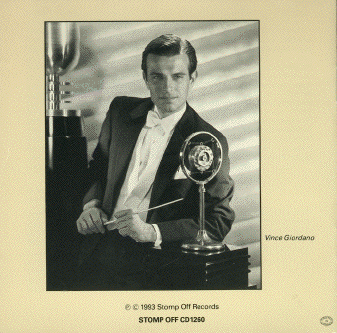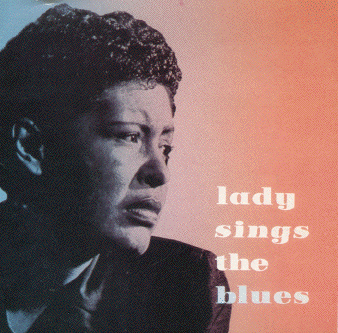HOME
BLOG LIST
MARCH, 2006
MAY, 2006
Saturday, April 1, 2006
 Everybody
remembers Harpo as the guy in the blond wig who chased girls while
honking a bulb horn. What may not be as well remembered is that
he was a wonderful musician. It was too long in coming, but this
CD contains two of Harpo's three albums, "Harpo in Hi Fi",
originally released in 1957, and "Harpo at Work" originally
released in 1958. The first LP featured Harpo with an octet of
"drums; one reed man doubling flute, clarinet, and piccolo;
bass; guitar; cello; vibraharp; and two pianos doubling celeste."
Among the songs are classics from the Golden Age of popular music
such as My Funny Valentine, Tenderly, Autumn
Leaves, Honysuckle Rose, and That's All. The second
album added a string section, and included more great songs, such
as Laura, My Blue Heaven, The Man I Love, Imagination, All
the Things You Are and Solitude. These 24 cuts leave
me wanting somebody to reissue the 1952 EP "Harp by Harpo",
and wishing that Harpo had recorded more than just three albums.
Everybody
remembers Harpo as the guy in the blond wig who chased girls while
honking a bulb horn. What may not be as well remembered is that
he was a wonderful musician. It was too long in coming, but this
CD contains two of Harpo's three albums, "Harpo in Hi Fi",
originally released in 1957, and "Harpo at Work" originally
released in 1958. The first LP featured Harpo with an octet of
"drums; one reed man doubling flute, clarinet, and piccolo;
bass; guitar; cello; vibraharp; and two pianos doubling celeste."
Among the songs are classics from the Golden Age of popular music
such as My Funny Valentine, Tenderly, Autumn
Leaves, Honysuckle Rose, and That's All. The second
album added a string section, and included more great songs, such
as Laura, My Blue Heaven, The Man I Love, Imagination, All
the Things You Are and Solitude. These 24 cuts leave
me wanting somebody to reissue the 1952 EP "Harp by Harpo",
and wishing that Harpo had recorded more than just three albums.
Monday, April 3, 2006
About all I got done this weekend was clearing
the lumber and scraps off the front porch, and finishing the trim
on one of the bathroom windows. A little more sanding, and it
will be ready for paint. The trim for the other window will have
to wait until the shower enclosure is installed.
I spent most of Sunday moping around with
a cold. With nice warm weather, I was able to take a nap on the
front porch swing.
Thursday, April 6, 2006
Today I picked up the rest of the tile for
the bathroom, along with a tile saw, trowels, and mortar.
Saturday, April 8, 2006
This guy is the embodiment of the the old
figure of speech about marching to a different drummer. When Reggie
Robinson was in grade sc hool, a visiting group of musicians presented a cultural
program that included The Entertainer, by Scott Joplin,
and the boy was hooked. By the age of thirteen, he had decided
that he would become a ragtime pianist and nagged his mother into
buying him a cheap electronic keyboard. At fourteen he left school
to spend full time on music. By the time he was twenty, in 1993,
he had recorded this Delmark CD which contains his performance
of Joplin's Maple Leaf Rag and 21 of his own ragtime pieces.
In an era when high quality music of any kind is wildly unpopular,
it's amazing to see a young guy like this writing and performing
ragtime of such quality that people who don't realize he's playing
his own compostitions think they're hearing Joplin.
hool, a visiting group of musicians presented a cultural
program that included The Entertainer, by Scott Joplin,
and the boy was hooked. By the age of thirteen, he had decided
that he would become a ragtime pianist and nagged his mother into
buying him a cheap electronic keyboard. At fourteen he left school
to spend full time on music. By the time he was twenty, in 1993,
he had recorded this Delmark CD which contains his performance
of Joplin's Maple Leaf Rag and 21 of his own ragtime pieces.
In an era when high quality music of any kind is wildly unpopular,
it's amazing to see a young guy like this writing and performing
ragtime of such quality that people who don't realize he's playing
his own compostitions think they're hearing Joplin.
Saturday was the first big tile day. I got
the floor tile installed in the shower and spent the rest of the
day cutting and fitting the tile for the rest of the bathroom
floor, until I got to taking up the toilet. That was a bit of
a snag because one of the anchor bolts was loose and turned with
the nut. Because of that I spent over an hour just getting the
toilet out. Sunday will be another tile day.
Sunday, April 9, 2006
Today I installed the bathroom floor tile.
Even ungrouted , it's a big improvement over the old falling-apart
linoleum.
Tuesday, April 11, 2006
This afternoon I grouted the bathroom floor.
It looks pretty good.
Wednesday, April 12, 2006
Started installing baseboard tile.
Thursday, April 13, 2006
Finished installing most of the baseboard
tile.
Friday, April 14, 2006
Grouted baseboard tile.
Saturday, April 15, 20 06
06
He's been called "the Pavarotti of
the plains". Don Walser is an old-time, down-home, Texas
cowboy singer. He even yodels. Many of the songs here are his
own compositions, written and performed in traditional country
style. One is called Country Gold, and Don says, "This
song is for all of the real country fans that live in this country
and can no longer hear real country music. I miss being able to
listen to all the great old country singers both male and female.
But what bothers me most is seeing the new young singers who are
the new traditional country singers, the new Merle Haggard, George
Jones, Patsy Cline and new Bluegrass singers who cannot be heard
because the so-called powers-that-be say they are too country."
Along with the Walser songs here, there are a few old favorites.
The title song, I'll Hold You in My Heart, was a big hit
for Eddy Arnold in the 1940's. Also included are Merle Haggard's
Hungry Eyes and the classic When It's Springtime in
the Rockies. If you have little or no patience for what passes
for country music on radio today, here's a very enjoyable antidote.
I spent Saturday, from 6 AM to 7 PM, cutting
and installing tile in the shower. One more day should finish
the job.
Sunday, April 16, 2006
I put the toilet back in the bathroom and
finished installing tile in the shower. After Easter lunch at
my cousin Irene's, her granddaughter, visiting from New York with
her husband and two kids, came out for a tour of the place. I
ended the day by putting up the old shower curtain for the last
time and enjoying the luxury of a shower.
Monday, April 17, 2006
This afternoon I put up the last piece of
shower tile and applied grout. Looks pretty good.
Tuesday, April 18, 2006
In a recent post on my favorite discussion
forum, somebody referred to a piece of equipment as "the
only good thing that ever came out of Massachusetts". Let's
remember:
"By the rude bridge that arched the flood,
Their flag to April's breeze unfurled,
Here the embattled farmers stood,
And fired the shot heard 'round the world."
On April 18, 1775, those Massachusetts farmers at Lexington and
Concord risked their lives facing the world's most powerful empire.
Some of us think the American Revolution, which began in Massachusetts
231 years ago today, was a good thing.

Saturday, April 22, 2006
This time instead of the front of the CD,
I'm showing the picture from the inside. Vince Giordano and his
Nighthawks have issued several recordings, but not enough. This
one is named for one of the cuts, Quality Shout! With Giordano
on string bass, tuba, and bass saxophone, the Nighthawks bring
you hot jazz from the Jazz Age. Many of the arrangements are transcribed
from original recordings by great jazz bands. Some are famous
names like Red Nichols, King Oliver, Duke Ellington, Fletcher
Henderson, and Jimmy Lunceford. Others are less familiar, like
Red and Miff's Stompers, Phil Napoleon, and the Paul Howard Quality
Serenaders. Most of the pieces are from the late 1920's, with
the latest being from 1931. This type of music is now considered
outmoded and is rarely played, which makes the Nighthawks such
a treat. This is not easy music to play, and these guys do a great
job ot it. The 22 cuts on this CD add up to more than an hour
of classic hot jazz played by real pros, so you get your money's
worth.
Sunday through Friday, April 23-28, 2006
Most of my afternoons were spent finishing
woodwork in the bathroom: cutting and fitting molding, assembling
frames, and filling and sanding nail holes & joints.
Saturday, April 29, 2006
This week's music comes from Lady Day. Billie
Holiday made her mark as a singer in the 1930's, when the popular
music was jazz. Not blessed with a great voice, she was a great
singer through phrasing and feeling. Some critics claim that her
early recordings are her best. By the 1950's, with the ravages
of heroin addiction and an otherwise hard life, they say her singing
lacks the breezy joy heard in her early work. Others appreciate
the emotion and storytelling she brought to a song in her last
years. This CD falls into the latter category, containing sessions
in 1954, in Los Angeles, and 1956, in New York. Both sessions
feature some of the best musicans of the era, including Charlie
Shavers, Kenny Burrell, Willie Smith, Barney Kessell, Sweets Edison,
and other top jazz performers. The songs begin and end with the
blues, opening with Lady Sings the Blues and finishing
with Stormy Blues. Songs in between includeHoliday's own
God Bless the Child, favorite standards like Love Me
or Leave Me, Willow Weep for Me, Too Marvelous for
Words, and P.S. I Love You. The dramatic highlight,
with a suitably dramatic trumpet intro by Shavers, is the bitter
and shocking Strange Fruit. This one song is worth the
price of the CD. Holiday delivers its angry metaphor in a way
that will elicit knowing nods from some listeners and will leave
others squirming. I once heard Dave Garroway remark that watching
Billie Holiday in her last days was like seeing a beautiful bird
being torn apart by vultures. As she lay dying in a New York hospital,
federal agents came to her room to arrest her for drug possession.
When she died on July 17, 1959, Lady Day left a large recorded
legacy of some of the greatest jazz singing of the century.
Sunday, April 30, 2006
I spent most of Saturday and Sunday painting
in the bathroom. Saturday I took time out to go to an auction,
but didn't buy anything. Sunday afternoon, while paint dried,
I went out and picked up debris along the road. We may have a
shortage of oil, or of wise statesmen, or of great restaurants,
but there will never be a shortage of low-down, trashy people.
HOME
BLOG LIST
MARCH, 2006
MAY, 2006
 Everybody
remembers Harpo as the guy in the blond wig who chased girls while
honking a bulb horn. What may not be as well remembered is that
he was a wonderful musician. It was too long in coming, but this
CD contains two of Harpo's three albums, "Harpo in Hi Fi",
originally released in 1957, and "Harpo at Work" originally
released in 1958. The first LP featured Harpo with an octet of
"drums; one reed man doubling flute, clarinet, and piccolo;
bass; guitar; cello; vibraharp; and two pianos doubling celeste."
Among the songs are classics from the Golden Age of popular music
such as My Funny Valentine, Tenderly, Autumn
Leaves, Honysuckle Rose, and That's All. The second
album added a string section, and included more great songs, such
as Laura, My Blue Heaven, The Man I Love, Imagination, All
the Things You Are and Solitude. These 24 cuts leave
me wanting somebody to reissue the 1952 EP "Harp by Harpo",
and wishing that Harpo had recorded more than just three albums.
Everybody
remembers Harpo as the guy in the blond wig who chased girls while
honking a bulb horn. What may not be as well remembered is that
he was a wonderful musician. It was too long in coming, but this
CD contains two of Harpo's three albums, "Harpo in Hi Fi",
originally released in 1957, and "Harpo at Work" originally
released in 1958. The first LP featured Harpo with an octet of
"drums; one reed man doubling flute, clarinet, and piccolo;
bass; guitar; cello; vibraharp; and two pianos doubling celeste."
Among the songs are classics from the Golden Age of popular music
such as My Funny Valentine, Tenderly, Autumn
Leaves, Honysuckle Rose, and That's All. The second
album added a string section, and included more great songs, such
as Laura, My Blue Heaven, The Man I Love, Imagination, All
the Things You Are and Solitude. These 24 cuts leave
me wanting somebody to reissue the 1952 EP "Harp by Harpo",
and wishing that Harpo had recorded more than just three albums. hool, a visiting group of musicians presented a cultural
program that included The Entertainer, by Scott Joplin,
and the boy was hooked. By the age of thirteen, he had decided
that he would become a ragtime pianist and nagged his mother into
buying him a cheap electronic keyboard. At fourteen he left school
to spend full time on music. By the time he was twenty, in 1993,
he had recorded this Delmark CD which contains his performance
of Joplin's Maple Leaf Rag and 21 of his own ragtime pieces.
In an era when high quality music of any kind is wildly unpopular,
it's amazing to see a young guy like this writing and performing
ragtime of such quality that people who don't realize he's playing
his own compostitions think they're hearing Joplin.
hool, a visiting group of musicians presented a cultural
program that included The Entertainer, by Scott Joplin,
and the boy was hooked. By the age of thirteen, he had decided
that he would become a ragtime pianist and nagged his mother into
buying him a cheap electronic keyboard. At fourteen he left school
to spend full time on music. By the time he was twenty, in 1993,
he had recorded this Delmark CD which contains his performance
of Joplin's Maple Leaf Rag and 21 of his own ragtime pieces.
In an era when high quality music of any kind is wildly unpopular,
it's amazing to see a young guy like this writing and performing
ragtime of such quality that people who don't realize he's playing
his own compostitions think they're hearing Joplin. 06
06
